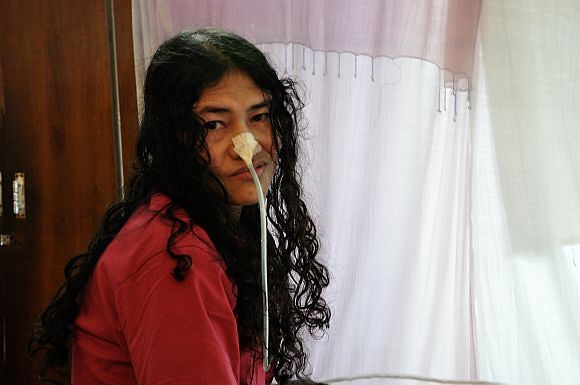Irom Sharmila in court again
Jun. 2nd, 2015 12:58 amOn June 4, Irom Sharmila will be in court in Delhi, which is to say, she'll be in a court that can capture the national eye (not so true of her appearances in court in Imphal, in the northeastern state of Manipur). The charge against her (attempted suicide, because of her hunger strike) is spurious, and worse, has the pernicious effect of distracting attention from her intention, which is to protest an unjust law--the Armed Forces Special Protection Act. People can be tempted to focus on getting her released, and yet, if she were just straight-up released, she'd very quickly die. The only way to truly save her is to work for the repeal of the AFSPA.

(image source)
Unfortunately, even in Manipur itself, there are those who benefit from the status quo. One journalist who has reported extensively on Manipur and AFSPA writes, "The political leadership, bureaucracy, Army and the insurgent groups all benefit from its biggest industry, AFSPA, and thus perpetuate its continuance" (Source).
How can things change? I don't know. But if it's so hard for the government in Delhi, the government in Manipur, and the army to disintangle from this law, then . . . maybe could the law be hollowed out from within? Could members of the armed forces be asked to make pledges to never violate civilian rights, and could there be rewards for honoring those pledges? Could development funds be tied to policies of inclusivity that assured that economic benefits extended to all ethnic groups and even to former insurgents? How do ordinary citizens in Manipur want things to go? What problems of daily life are most important to them? I cast about for ideas, but I'm not well informed about all the nuances of the situation on the ground, and it's not for me to suggest or conclude anything. I can only watch from the sidelines, biting my nails, and hoping.

(image source)
Unfortunately, even in Manipur itself, there are those who benefit from the status quo. One journalist who has reported extensively on Manipur and AFSPA writes, "The political leadership, bureaucracy, Army and the insurgent groups all benefit from its biggest industry, AFSPA, and thus perpetuate its continuance" (Source).
How can things change? I don't know. But if it's so hard for the government in Delhi, the government in Manipur, and the army to disintangle from this law, then . . . maybe could the law be hollowed out from within? Could members of the armed forces be asked to make pledges to never violate civilian rights, and could there be rewards for honoring those pledges? Could development funds be tied to policies of inclusivity that assured that economic benefits extended to all ethnic groups and even to former insurgents? How do ordinary citizens in Manipur want things to go? What problems of daily life are most important to them? I cast about for ideas, but I'm not well informed about all the nuances of the situation on the ground, and it's not for me to suggest or conclude anything. I can only watch from the sidelines, biting my nails, and hoping.
no subject
Date: 2015-06-02 07:36 am (UTC)I have never bought into the trial as distraction theory. The protesters protest too much. If a citizen is wronged the last redress they have in a democracy is the courts. I know this throws people who already know all the facts who the guilty are who did what when and to whom. But for the rest of us a trial is one way of getting the facts out in the open. In prison all cats are grey. If she was being well looked after she would not be given any respect at all by anyone.
She was tortured this much has already been determined by two superior courts two different forms of torture, the Indian NRHC and its Supreme Court. Torture of itself is not illegal in India. It is considered still an effective police tool once they have the guilty party. What americans refer to as the ticking clock scenario but once you accept torture can give you evidence then you're just haggling. Let a magistrate's court look at on-going evidence then. It goes against the prosecution case. If they claim the imprisonment is therapeutic why the isolation orders and petty humiliations. As for the defence if she was ever allowed to make one. Best defence against a charge of attempt to commit suicide is to put forward satyagraha. The trial once it starts can never distract from the issues because the defence would naturally put forward the truth that this is a political fast the primary purpose of which is to shame men of power into repealing the law that decriminalizes rape and murder. I would have brought rebuttal witnesses for example the Chief Minister of Manipur Ibobi Singh and counter that Sharmila is not the one who is mentally imbalanced he is. And all the celebs who love to appear on Telly could have a field day. The Media may not come for one celeb but a cohort of celebs attracts a gaggle of correspondents.
no subject
Date: 2015-06-03 04:01 am (UTC)once you accept torture can give you evidence then you're just haggling.
I agree: torture must always, and unequivocally, be rejected.